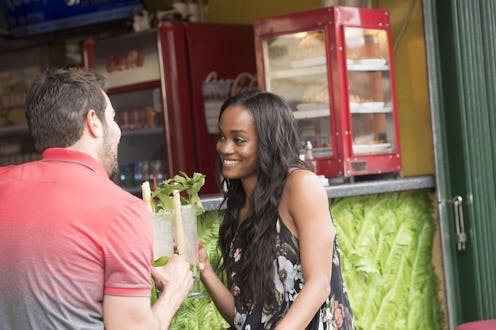Entertainment
Rachel Didn't "Solve" 'The Bachelor' Franchise's Diversity Problem

The time has come for Rachel Lindsay to make her final Bachelorette eliminations, and hopefully receive the proposal that will make her happy. The season is done, hopefully Rachel is on good terms still with whomever she chose, and now the next season of The Bachelor needs to start looking for its cast of women to compete for a new man's heart. And while Rachel's season was a huge milestone, there are more forms of diversity for The Bachelor to incorporate than just casting black people on the show. That's not to discount the meaning of having Rachel lead this season of The Bachelorette — black women are so rarely considered romantically viable on the series, or in media in general, and this was an important step for the franchise.
But Rachel doesn't "solve" the show's storied diversity problem. There are more avenues for the show to take in future seasons, starting with the next Bachelor, that will make the show's commitment to diversity clear and stop Rachel from ever seeming tokenized. She was absolutely the right person to be cast, but she shouldn't go down as a victim of a temporary diversity trend. Incorporating more people and broadening this popular show can only be a good thing. Here are a few ways The Bachelor and Bachelorette can get more inclusive in seasons to come.
More Pointed Racial Choices
There are other forms of racial diversity that audiences should be prepared to expect if ABC is serious about breaking boundaries. Asian men, like black women, are discriminated against while online dating, according to The Washington Post. Making sure to cast in California, Texas, Hawaii, or one of the many other places in the US with a large Asian population will help set the stage for a future Asian Bachelor or Bachelorette. Surely, there is an Asian-American "Whaboom" out there for the show to find.
Or Cultural/Ethnic Ones
Similarly, casting Muslim contestants or more Latinos could bring important representation for the series, showing cultural/ethnic diversity in addition to racial diversity. If Bryan, who is Latino, doesn't win Rachel's heart in the season finale, he could become the Bachelor — though fans may not like this former "Player" getting another shot on the show.
LGBTQ People
The concept of the series is embarrassingly straight, and there are more possibilities than just having a "Gay Bachelor" or "Lesbian Bachelorette" season. Why haven't there been more openly bisexual, pansexual, or queer contestants? (Jaimi from Nick's season was the only openly bisexual contestant in the show's history.) And there has never been an openly trans competitor either. This series will always be steeped in very old fashioned relationship standards, but for many people, LGBTQ (and beyond, like intersex, asexual, or aromantic) partners are just a normal part of dating and falling in love. At the very least, the show needs to never again give the same-sex friendship that forms a "romantic" edit like JJ and Clint got in the above video.
Someone Gender Nonconforming
Beyond different orentations or sexual preferences, it would be great to see anyone on the show who doesn't fall neatly into the gender binary. The show's competitors often fit into such narrow categories. It's time to unpack gender on The Bachelor. Let's do it.
Disabilities Should Be Represented Too
Television is sorely lacking in physical or mental disability representation. While being represented on The Bachelor franchise alone won't change decades of discrimination, it can help. There is one contestant with a disability who was on The Bachelor and Bachelor in Paradise, Sarah Herron, who was born without a left hand, but — like with Jaimi, one is not enough. There needs to better representation of people of all abilities.
The Autism Spectrum Should Be Represented
No person cast on the franchise has ever spoken openly about being on the autism spectrum, but that's another possibility for the show to open its horizons. The Bachelor and Bachelorette have always cast a narrow personality type — for the most part they're all good looking, athletic, outgoing extroverts. But with so few ASD people or characters on television — and with many of those portrayals using similar archetypes of the emotionless, male genius — casting real people who really are on the autism spectrum might help show audiences that not every person who isn't neurotypical acts like Benedict Cumberbatch's character on Sherlock.
Hopefully Rachel's season wasn't an anomaly and is actually a sign that more choices will be made ahead to represent other groups in the same way. Millions of viewers are tuning in to this show, and they deserve to see themselves on screen and see people of all types afforded this chance to fall in love.